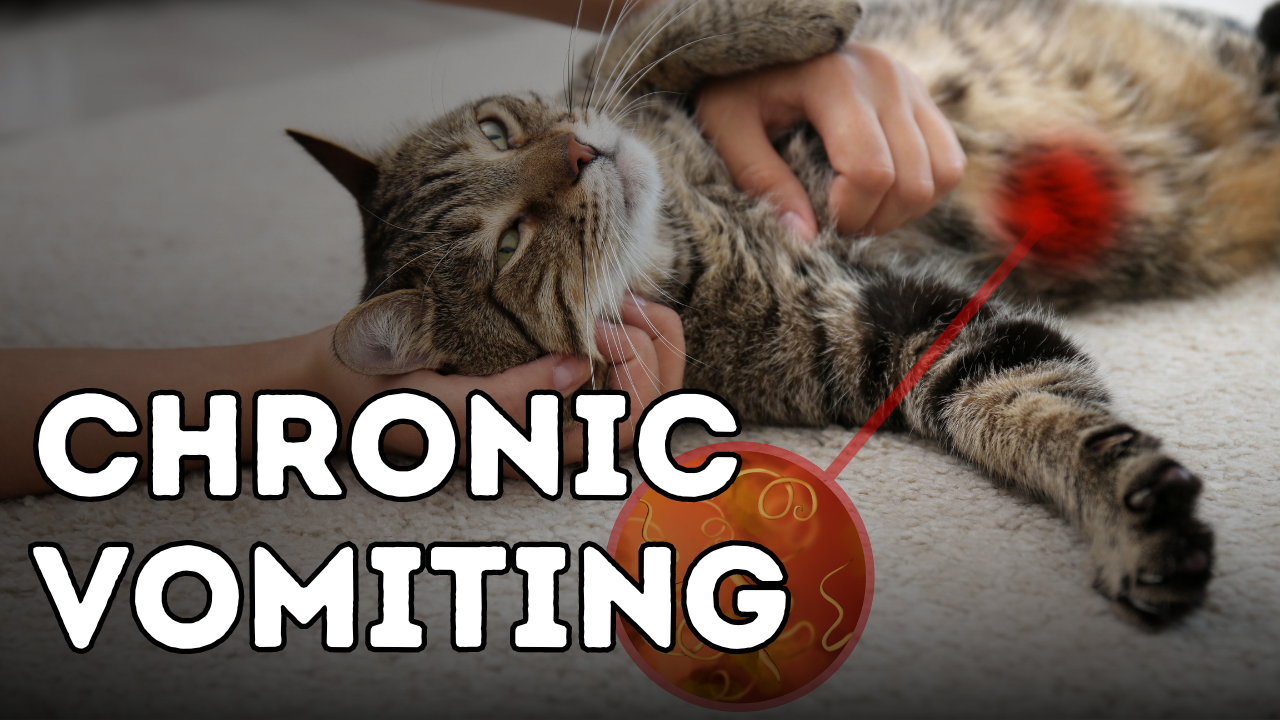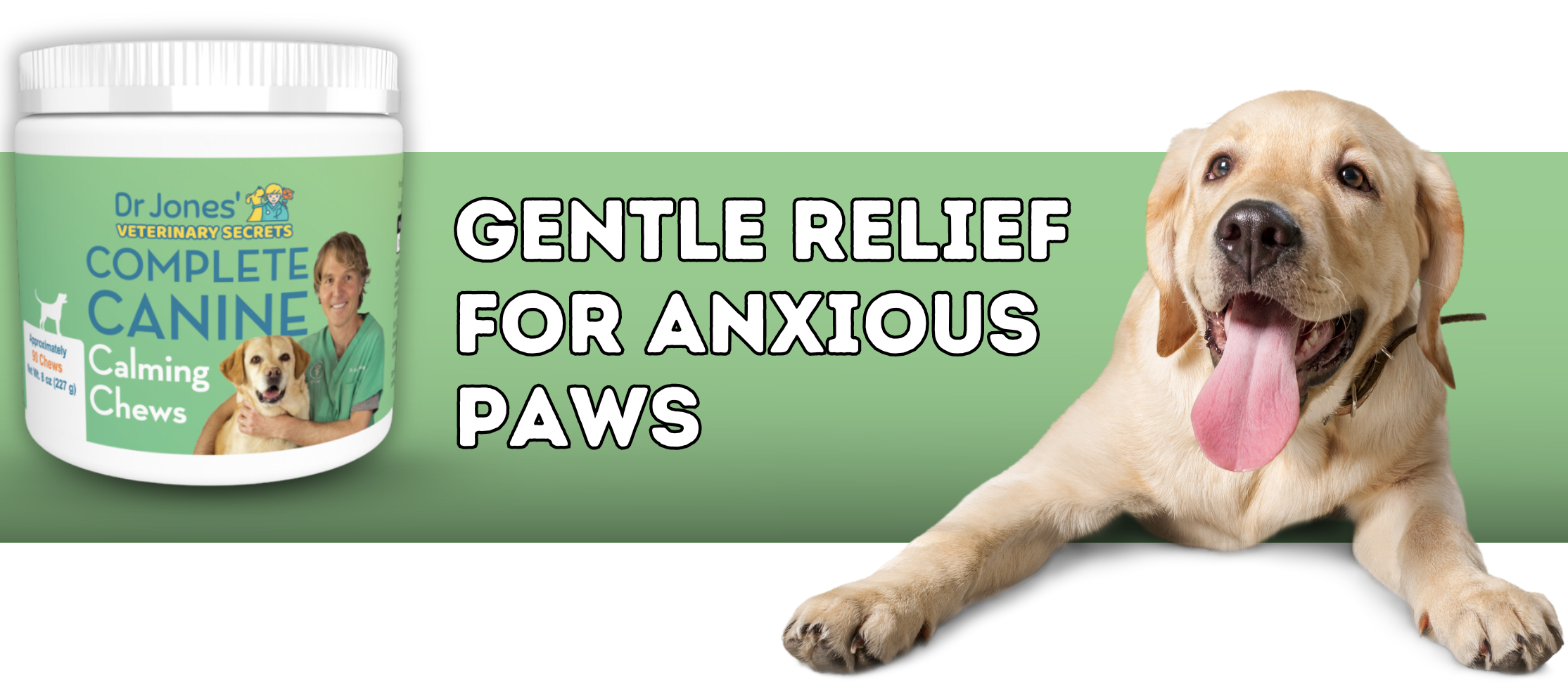Stop Chronic Vomiting and Diarrhea: Dr. Jones’ Best Practices for IBD in Pets

Chronic vomiting, diarrhea, upset/painful stomach, acid reflux: these are some of the signs of inflammatory bowel disease (IBD), which is way to common in our dogs and cats.
What CAN you do?
Well as an alternative option, you should consider trying our NEW Digestive Enzyme Supplement: Dr Jones’ COMPLETE Digestive Care Soft Chews


Inflammatory Bowel Disease (IBD) in Dogs and Cats
Introduction to IBD Inflammatory Bowel Disease (IBD) in dogs and cats is a syndrome caused by a specific reaction to chronic irritation of the intestinal tract. It is characterized by the infiltration of inflammatory cells into the lining of the intestine, which leads to an allergic-type response and interferes with the ability to digest and absorb nutrients. This disease is often suspected to be triggered by hypersensitivities to food or bacterial antigens, although the exact cause remains unknown.
Clinical Signs of IBD The most common clinical signs of IBD include chronic vomiting and diarrhea, which can lead to weight loss and poor appetite. In some cases, pets may develop a voracious appetite due to their inability to absorb nutrients effectively. IBD can affect any part of the gastrointestinal (GI) tract but is most often found in the stomach and intestines.
Treatment Options for IBD
Dietary Management
- Novel Protein or Hydrolyzed Protein Diets: These diets help minimize the immune response in the GI tract.
Supplements and Medications
- Probiotics: Such as ULTIMATE Canine/Feline and Digestive Care Soft Chews, which contain beneficial bacteria.
- Anti-diarrheals: For example, loperamide with a recommended dose of 1mg/20lbs twice daily for three days.
- Natural Immunosuppressives: Cannabidiol (CBD), administered at 3mg/10lbs twice daily, and licorice root, used as a natural steroid alternative at a dose of 1/4ml per 10lbs twice daily for 10 days.
Herbal Treatments
- Slippery Elm: Prepared from the inner bark of the Slippery or Red Elm tree, it forms a gel that lubricates the digestive tract and reduces inflammation. Dose: 1/8 to 1/4 teaspoon of the bark powder once or twice a day, or one 350-400mg capsule a day.
Supplements That Aid Digestion
- Digestive Enzymes: These are important for pets with IBD, as they can reduce intestinal distress. It’s crucial to use a quality enzyme product containing amylase, lipase, and protease. Dr. Jones’ COMPLETE Digestive Care Soft Chews are an example.
Innovative Treatments
- 95% Curcumin (BCM-95): A high-potency turmeric extract, which has been shown to be more effective than standard curcumin in reducing the inflammatory burden of colitis.
IBD in pets is a challenging condition, but with the right combination of dietary management, supplements, and possibly herbal treatments, many dogs and cats can lead a healthier and more comfortable life. Always consult with a veterinarian to tailor a treatment plan suited to your pet’s specific needs.
P.S. There are many natural options for our dogs and cats with IBD, but it really is a frustrating disease to treat. It’s great to see that simple supplements such as Slippery Elm and Digestive Enzymes can help.
Dr. Jones’ Complete Digestive Care Soft Chews are a tasty and beneficial treat your dog will love! Our chews contain a proprietary Digestive Enzyme Blend and 2 Billion CFUs of beneficial Probiotics. These chews can help dogs with issues related to poor nutrient absorption, such as food allergies and sensitivities, Pancreatitis, Exocrine Pancreatic Insufficiency (EPI), and Inflammatory Bowel Disease

My cat 2 yrs is vomiting once a day, every 3-4 days. When 1st started about a year ago had blood work,x-rays all ok.was on wet food,then novel protein then refused then switched to dry kibble threw up that every time he ate it, right now only food he will eat is freeze dried raw chicken by Instinct. Maybe need to try prescription hydrolyzed protein but sure he will refuse that. Otherwise healthy activeplayful sleeps good and god pee and poops.I have seen your videos re natural remedies such as Pepcid, Slippery Elm but sure I can’t use these long term.
Any thoughts/suggestions.
Thank you
Well, there are many reasons why cats vomit and hope this article can help:
Home Remedies for Cat Vomiting
If your cat has suddenly been acutely vomiting or has been vomiting on and off for a couple of weeks, the very first thing to do is to assess how seriously sick your cat is. For you to decide whether to use home remedies or to see a vet, these guide questions will help you access your cat’s condition:
– Is your cat still very alert, active, eating and drinking? If that’s the case, your cat is a good candidate for home remedies.
– Is your cat lethargic or dehydrated? If yes, then that’s something more serious and would most likely need an urgent veterinary attention.
Common causes of cat vomiting
· Hairballs
Cats constantly groom themselves and long-haired cats or cats that have excessive amount of hair loss or shedding are very prone to hairballs.
· Ingestion of Substances
Cats sometimes end up eating random things that may not agree with their stomach. It can be food lying on the ground, plants, string, medicines or chemicals left unattended.
· Food Intolerance or Food Allergy
Two most common allergens for cats are fish and dairy. Food allergy may be manifested by vomiting or diarrhea, sometimes skin lesions, hair loss or scratching around the face.
· Inflammatory Bowel Disease (IBD)
Feline inflammatory bowel disease (IBD) is a condition in which a cat reacts to something it has ingested causing its gastrointestinal tract to become chronically irritated and inflamed. This condition could cause chronic vomiting and/or diarrhea.
· Metabolic Diseases
Vomiting in cats may be a symptom of more complicated metabolic disease such as liver disease and kidney disease.
Home Remedies
· Appropriate Diet- To help your cats with hairballs, make sure that they’re on appropriate diet. Opt for canned food with additional essential fatty acids instead of dry kibble. This will give them healthy hair coat and they’ll be shedding less hair which means less hairballs.
· Grooming- Groom you cat more often. You don’t have to spend so much on it though. Just get some de-shedders and remove some of the hair so they don’t end up ingesting them.
Vaseline (unflavored petroleum jelly)- Help your cat ingest 1/4 inch of Vaseline twice a day for 2-3 days to expel that hairball.
· Chamomile or Peppermint Tea- Leave your tea bag for 10 to 15 minutes so it’s reasonably strong. Let it cool and give 5mL or 1 teaspoon to your cat 2-3 times daily.
· Homeopathic Arsenicum Album 30C- This is homeopathic remedy that is most often used for vomiting and diarrhea. The standard cat dose is 1 30C capsule twice daily
· Slippery Elm – This remedy is specifically for inflammatory bowel disease (IBD). Depending on your cat’s weight, the dose should be 400mg/10lbs, taken once a day. Just Break the capsule and mix it with cat food, or give your cat 1 capsule orally/day
· Famotidine (10mg) – This antacid is an over the counter medication also known as Pepcid. This remedy is intended for a short term use and should be given at 2.5mg every 8 hours for 2-3 days.
Probiotics (Lactobacillus and Bifidobacterium) – A quality probiotic supplement is a good idea for ANY cat that is chronically vomiting. The good bacteria can decrease gut inflammation, lessening the vomiting.